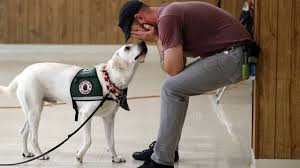Therapy Service Dog Training: Enhancing Lives One Paw at a Time
Therapy service dogs play a crucial role in improving the quality of life for individuals facing various physical, emotional, and mental health challenges. These specially trained canines provide comfort, support, and companionship to those in need, offering a unique form of therapy that goes beyond words.
Training therapy service dogs requires a combination of skill, patience, and dedication. These remarkable animals undergo rigorous training to develop the necessary skills and temperament to excel in their roles. From basic obedience commands to advanced tasks tailored to specific therapeutic needs, each dog is carefully prepared to provide the highest level of support and assistance.
One key aspect of therapy service dog training is socialisation. These dogs must be comfortable and confident in a variety of environments and around different people. They learn to remain calm and focused in potentially stressful situations, ensuring that they can provide effective support in any setting.
Furthermore, therapy service dogs are trained to respond to cues from their handlers and offer comfort through gentle interaction. Whether it’s providing emotional support during times of distress or simply being a calming presence in challenging situations, these dogs have an innate ability to connect with individuals on a deep level.
The impact of therapy service dogs on the lives of those they assist cannot be overstated. From helping individuals cope with anxiety and depression to providing companionship for those feeling isolated or lonely, these furry companions bring joy and healing wherever they go.
At the heart of therapy service dog training is the belief that every individual deserves compassion, understanding, and support. Through the dedication of skilled trainers and the unwavering loyalty of these incredible animals, lives are transformed one paw at a time.
If you or someone you know could benefit from the presence of a therapy service dog, consider reaching out to reputable organisations that specialise in training these remarkable animals. Together, we can continue to harness the power of human-animal bonds for the betterment of society as a whole.
Common Questions About Training and Working with Therapy Service Dogs
- Can my dog become a service dog?
- How do I train my dog as a Therapy Dog?
- Do guide dog trainers get paid?
- What does a Therapy Dog do?
Can my dog become a service dog?
For many dog owners, the question of whether their beloved pet can become a service dog is a common one. While not every dog has the temperament or training to become a service dog, it is possible for certain dogs to undergo the necessary training and certification to fulfil this important role. Service dogs require specific qualities such as calmness, obedience, focus, and the ability to perform tasks that assist individuals with disabilities. If your dog demonstrates these traits and you are committed to the rigorous training process, there is potential for them to become a service dog and make a meaningful impact on the lives of those in need.
How do I train my dog as a Therapy Dog?
Training your dog to become a therapy dog involves a structured process that focuses on developing specific skills and behaviours tailored to providing comfort and support to individuals in need. To begin, it is essential to ensure that your dog has a calm and friendly temperament, as these qualities are fundamental for therapy work. Basic obedience training is a crucial foundation, teaching your dog commands such as sit, stay, and come reliably. Socialisation is also key, exposing your dog to various environments, people, and situations to build confidence and adaptability. Additionally, specialised training in tasks related to therapy work, such as gentle interaction and responding to cues from handlers, is essential. Seeking guidance from professional trainers or organisations experienced in therapy service dog training can provide valuable support throughout the process. With patience, consistency, and a genuine desire to help others, you can embark on the rewarding journey of training your dog as a therapy companion.
Do guide dog trainers get paid?
Guide dog trainers are typically employed by guide dog organisations or schools that specialise in training assistance dogs. These dedicated professionals play a crucial role in preparing guide dogs to assist individuals with visual impairments, enhancing their independence and mobility. Guide dog trainers are usually compensated for their work, receiving a salary for their expertise and dedication to training these remarkable animals. Their commitment to improving the lives of others through the power of human-animal bonds is both rewarding and essential in the field of assistance dog training.
What does a Therapy Dog do?
A therapy dog plays a vital role in providing comfort, support, and companionship to individuals facing various physical, emotional, and mental health challenges. These specially trained canines offer unconditional love and empathy, helping to reduce stress, anxiety, and feelings of loneliness. Therapy dogs visit hospitals, nursing homes, schools, and other facilities to interact with people in need, bringing smiles and joy wherever they go. They are trained to respond to cues from their handlers and provide a sense of calmness and security through their gentle presence. Ultimately, a therapy dog’s primary purpose is to enhance the well-being of those they encounter and spread positivity through their unique ability to connect with people on a deep emotional level.

